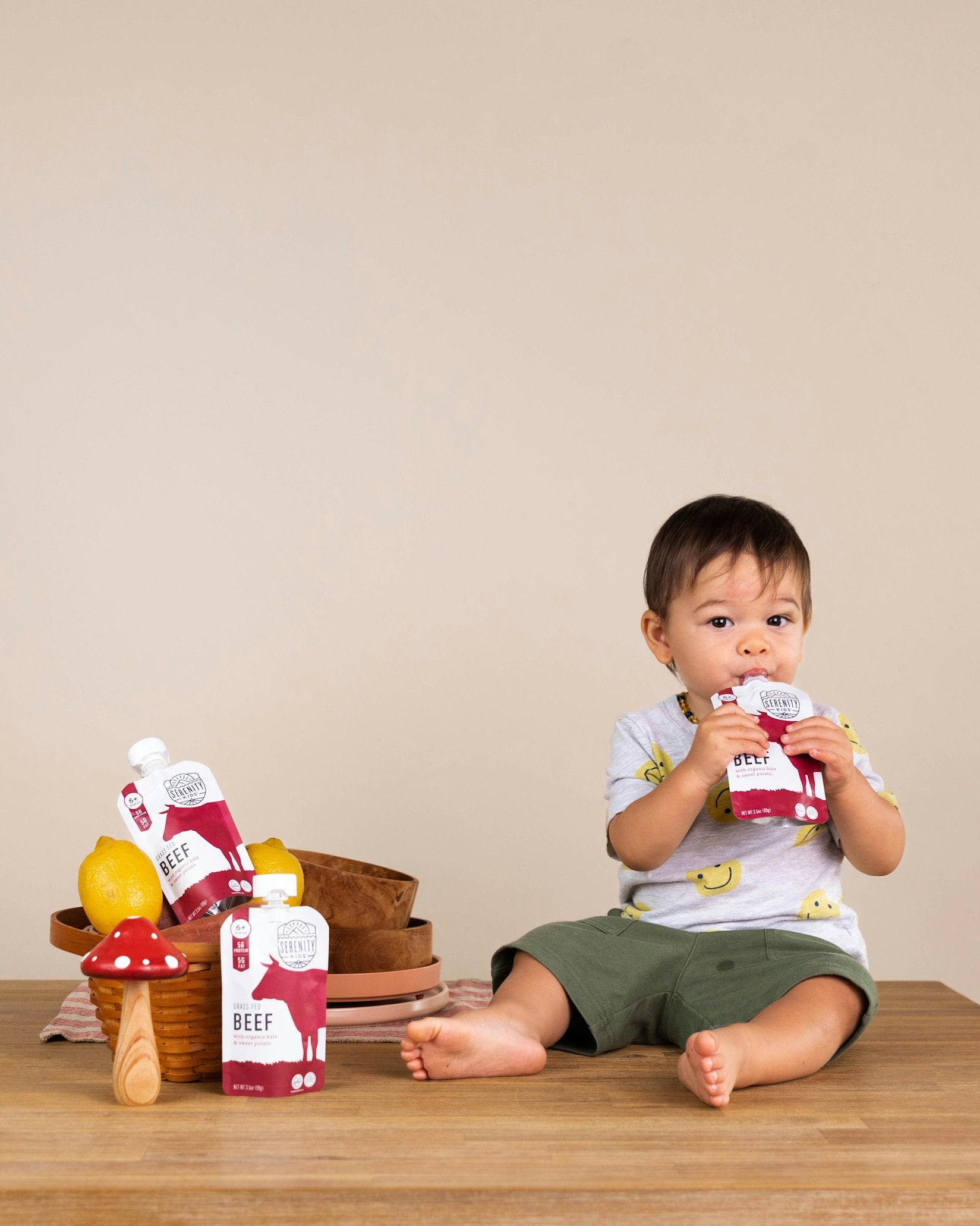TABLE OF CONTENTS
Written by Hillary Bennetts
April 25, 2024
Choosing the Best Sources of Protein for Babies

As you navigate the first few years of your child’s growth, understanding what nutrients they need is crucial to their health and well-being. Babies need a variety of micronutrients like vitamins and minerals, but they also need a good balance of macronutrients - protein, fat, and fiber.
In this article, we're honing in on protein intake. Why is protein important? How much protein do babies need? And what are the best sources of protein?
Key Takeaways
Protein is essential for a baby’s growth. It supports muscle and tissue development, immune function, hormone production, and brain health.
Breast milk and formula provide the necessary protein and essential amino acids for infants. In fact, breast milk even adapts to the changing nutritional needs of your baby.
Introducing a variety of protein-rich solid foods at around six months supports continued development. Incorporating solids allows babies to receive nutrients from sources beyond milk as they grow older.
Protein Essentials for Babies
The key to unlocking protein's potential lies in the foods we feed our little ones. So, let’s take a closer look at the various types of protein foods, understand the role of essential amino acids, and discuss how to ensure your baby gets enough protein from their diet.
The Role of Protein in Baby's Growth
Protein plays a critical role in supporting optimal growth and development in children. It helps to construct and repair muscles and tissues, supports normal immune function, and produces essential enzymes and hormones.
Recent research in Europe suggested that infants need about 1.3 grams of protein per kilogram of body weight. At an average weight range of 16 to 22 pounds for babies 6 to 12 months of age, this translates to a daily protein requirement of about 9-13 grams of protein per day.
Essential Amino Acids
Amino acids are the building blocks of proteins, and they play vital roles in various bodily functions. They also play an important role in the growth and development of babies. Some amino acids, called "essential amino acids" are amino acids that cannot be synthesized in the body, so they must be consumed in the diet. There are nine essential amino acids:
- Histidine
- Isoleucine
- Leucine
- Lysine
- Methionine
- Phenylalanine
- Threonine
- Tryptophan
- Valine
Both breast milk and infant formula contain these essential amino acids. The World Health Organization recommends breast milk or formula as the exclusive source of nutrition for the first six months of life. Once solids are introduced and breast milk or formula are discontinued, essential amino acids must be obtained through food intake.
Protein in Breast Milk and Infant Formula
Whether you’re breastfeeding or formula feeding, your baby is getting essential proteins needed for their growth and development.
While both breast milk and infant formula are excellent sources of protein, they have key differences. Let’s take a closer look at the protein content in breast milk and infant formula.
Protein in Breast Milk
Breast milk is an amazing substance that actually adapts to the needs of a baby. That means that the nutrients in breast milk, including the protein content, can change over time. In addition to the customization of breast milk, it also includes bioactive components that support the infant’s immune system, like essential microbes, human milk oligosaccharides (HMOs), immunoglobulins, lactoferrin, and dietary polyunsaturated fatty acids. However, not all mothers can or choose to breastfeed, and instead turn to infant formula.
Protein in Infant Formula
Infant formula typically contains more protein than breast milk, which may influence a baby’s growth patterns. There are a variety of different formulas available to cater to infants with specific health concerns. For example, babies who cannot tolerate cow’s milk protein may find that they do well on a goat milk-based formula or even an A2 milk formula.
Introducing Solid Foods: High-Protein Options for Babies
As your baby grows, so do their nutritional needs. Around six months of age, you’ll start to introduce solid foods to your little one’s diet. This is an exciting time as you get to explore a whole new world of flavors and textures with your baby. But it’s also a critical time for their development, as they start to get essential nutrients from sources other than breast milk or formula. While you may hear that breast milk contains everything a baby needs for his or her first year, the truth is that some nutrients may decline in breast milk and should be included in their diet. These include iron, zinc, B vitamins, and vitamin D.
Nutrient-dense foods like meat, fish, eggs, and dairy products can help fulfill the protein needs in a baby’s diet once they start eating solid foods. They also contain other important nutrients for growth and development. Let’s explore these options further.
Meat and Fish
According to the World Health Organization (WHO), meat is considered an excellent source of high-quality protein and micronutrients and should be consumed by infants who are consuming solid foods.
Meat and fish include many important nutrients in addition to protein. For example, beef and chicken contain iron, zinc, choline, and B vitamins.
An ounce of meat or fish contains 6-9 grams of protein. That means that it doesn't take much to meet your little one's needs. Remember, their bellies are small!
Options include chicken, pork, beef, lamb, turkey, liver, salmon, sardines, and more! Try various forms of each, like a long slice of steak that a baby can suck on, ground beef crumbles they can pick up with a pincer grasp, or ground beef formed into meatballs.
Babies tend to do better with fattier cuts of meat as they aren't as dry, so chicken thighs are easier for them to eat than chicken breasts. As a bonus, they’ll get more healthy fat, which is also essential for development.
Dairy and Eggs
Eggs are an excellent source of protein, fat, choline, and B vitamins. They can be prepared in several ways that are baby-friendly. Just be sure to include the yolk, as it contains a majority of the nutrients.
If desired, babies can start to eat yogurt and cheese once they start eating solids. Both are great sources of calcium. Be sure to choose plain yogurt without any added sugar. Whole milk Greek yogurt is a great choice as it also contains healthy fats.
If you don't want to introduce dairy protein, or your baby cannot tolerate dairy you can opt for plant-based yogurts. Look for as few ingredients as possible. CocoYo and Cocojune are both coconut-based and do not include any gums, fillers, or added sugar. Note that these choices are not high protein like dairy-based yogurt, but they do contain healthy fats.
Plant-Based Proteins
Some parents may prefer to incorporate more plant-based proteins into their baby’s diet. There are plenty of plant-based options, but it is important to note that they typically do not come with the same density or availability of nutrients as animal proteins. For example, lentils contain iron, but it is the non-heme form of iron which isn't as well-absorbed as the heme form found in animal proteins. Plant-based proteins also do not contain B vitamins and are not as rich in protein. Other forms of plant-based protein include beans like black beans and garbanzo beans, which can be made into hummus for a softer pureed option.
Note that we recommend avoiding processed plant-based protein foods as they tend to contain highly processed protein isolates and inflammatory oils. We also stay away from soy and grain-based proteins because they are especially hard to digest, especially for infants.
Nut Butter
Nut butter provides some good protein and fat. Just be cautious of how you serve nut butter as it can be a choking risk. It works well mixed into yogurt or spread thinly on a slice of sweet potato toast. Top it with some hemp seeds for added flavor and nutrition. When a baby is older, you can introduce whole nuts, but they pose a choking risk at younger ages.
Tips for Incorporating Protein into Your Baby's Diet
Now that we’ve gone through the why and what of protein for babies, let’s discuss the how. How can you incorporate protein into your baby’s diet?
Balance each meal and each plate
Aim to include protein foods at each meal. This supports blood sugar balance and satiety and also spreads total protein intake out over the course of the day. In addition, aim to pair your protein with healthy fats and fiber-rich veggies.
Explore different forms and different types
Babies may not always take to a taste or texture on the first try. It's best to keep trying, as it can take several exposures for a little one to accept a new food.
You may also want to play around with different options. For example, you can try a protein-packed smoothie as part of your meal or snack. Or try a different form of the same meat. If your little one isn't taking to flaked salmon, try making salmon patties. We have more ideas for creatively fitting protein foods into the diet in this article.
Embrace convenience
Serenity Kids pouches are the ultimate in healthy convenience. Our flavorful and portable pouches are an optimal balance of protein and fat alongside nutrient-dense vegetables. They are also a great option for little ones who are hesitant with textures, or parents who want to stick with purees early on.
Summary
From the moment your baby takes their first sip of breast milk or formula, to when they try their first bite of chicken, protein plays a pivotal role in their growth and development. By offering a variety of protein-rich foods, from both animal and plant sources, you can ensure your baby gets the essential amino acids they need. Whether you’re breastfeeding or formula-feeding, introducing solid foods or tackling picky eating, remember that every meal is a step towards your baby’s healthy growth and development. So, here’s to the power of protein and to the joy of watching your little one grow!
You Might Also Like
· 1 min read · Recipes
· 7 min read · Education

















































